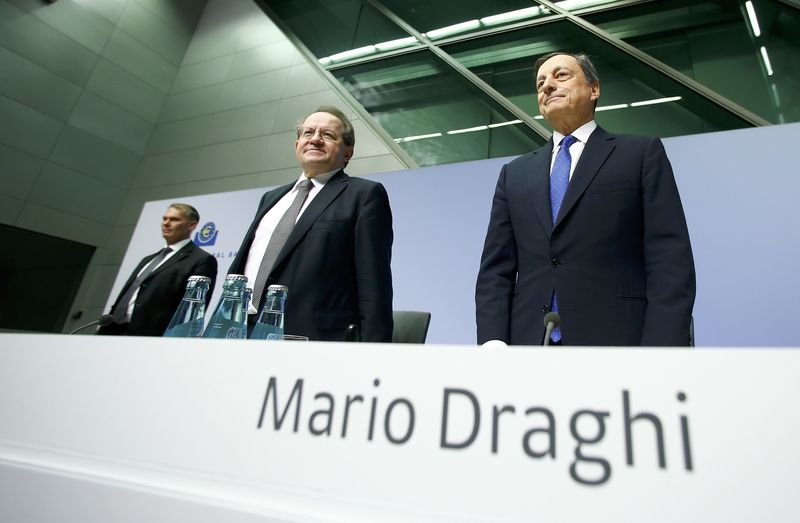By Balazs Koranyi and Francesco Canepa
FRANKFURT (Reuters) - The European Central Bank trimmed back its asset buys in a surprise move on Thursday but promised protracted stimulus to aid a still fragile recovery, and dismissed any talk of tapering the programme away.
With still no sign of a sustained rebound in underlying inflation and heightened political risk from looming elections in four of the euro zone's five biggest economies, the ECB promised to keep borrowing costs depressed longer than predicted, even reserving the right to raise back purchases if the outlook sours.
Although the cut in the volume of monthly assets buys suggests a concession to conservative countries such as Germany and the Netherlands, the underlying message was seen as dovish, catering to nations on the periphery and a boost for financial markets.
Catching financial markets off-guard, ECB President Mario Draghi said the bond buys would be cut to 60 billion euros (£51.04 billion) a month from 80 billion euros starting April but they would go on until the end of 2017, three months longer than expected.
"There is no question about tapering," Draghi said. "We can even go back to 80 (billion)... there’s a range of options."
"The key message... is to show that there is no tapering in sight, to show that the ECB is going to stay in the market, to show that we will continue to exert pressure on market prices," Draghi added.
The euro weakened 1.3 percent on the ECB's move and stocks surged 1 percent (STOXX), boosted by bank shares that have rallied all week.
ELECTIONS
With elections looming in France, Germany, the Netherlands and possibly Italy, and all facing strengthening populist movements, the ECB can hardly afford to ease back on the accelerator.
But much of its firepower is exhausted and Germany is growing increasingly frustrated with its unprecedented stimulus, so the bank has been under pressure to make at least a token nod to the haws, signalling that quantitative easing cannot go on forever.
"During the Q&A session, ECB president Draghi had difficulties sending a very clear message to markets on how to read today’s message," ING economist Carsten Brzeski said. "Throughout the press conference, he sounded more and more dovish."
The ECB has already spent more than 1.4 trillion euros ($1.5 trillion) buying bonds and is at risk of running out of assets. The Bundesbank argues that this blurs a legal line and can be considered central bank financing of budgets.
To make further buys possible, the ECB relaxed some of its self imposed rules, increasing the pool of eligible assets.
Bonds with maturity between 1 and 2 years will now be included in the asset buys and the bank will also purchase bonds yielding less than its -0.4 percent deposit rate, if necessary.
But in another small victory for conservative euro zone members, the ECB decided not to allow bond purchases to deviate from countries' shareholding in the bank, an issue considered a red line Germany's Bundesbank.
HAWKISH AND DOVISH
"By surprising on the dovish side with duration and at the same time tapering the purchase rate, the ECB has made a shrewd move in our view," HSBC economist Simon Wells said.
"By tapering, albeit conditionally, it has made a sop to its critics who think policy is already too loose," Wells said. "But it has also bought itself time and side-stepped a series of potentially difficult discussions about further extensions during 2017."
Underlying its promise for extensive stimulus, the ECB predicted inflation at 1.7 percent in 2019, arguing that higher energy prices could lift consumer prices even without lifting the underlying trend.
But when asked if the 1.7 percent met its goal of below but close to two percent, Draghi said: "Not really, so we have to persist."
"Uncertainty prevails everywhere," Draghi told a news conference.
Much to Draghi's concern, wage growth has also disappointed, suggesting that companies have cut their inflation expectations.
This is a hard-to-break cycle that could entrench anaemic price growth, making it harder to get it back to the desired at-or-just-below 2 percent.
Even consumption, the key driver of growth is not as good as it looks. Consumption has been driven a jump in disposable income due to oil price falls and loose ECB policy. But Brent crude (LCOc1) is up 14 percent in the past three months, leaving monetary policy as the chief driver of consumption.
Interest rates, seen by most to have bottomed out, were kept unchanged, with the deposit rate kept deep in negative territory.
Euro zone economic growth is shrugging off Britain's decision to leave the European Union, and Germany, the bloc's growth engine, seems to be picking up speed again.
Ironically, the collapse of Italy's government this week may hasten instead of delay the recapitalisation of ailing lender Monte dei Paschi (MI:BMPS), much to the ECB's relief. It has pointed to weak banks as an obstacle to transmitting stimulus.

"The vulnerabilities that both the banking system and Italy have been there for a long time. And so they ought to be coped with, and I am confident the government knows what to do and they will be dealt with," Draghi said.